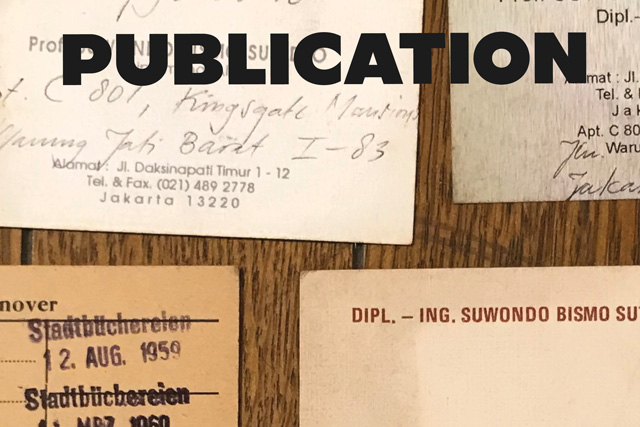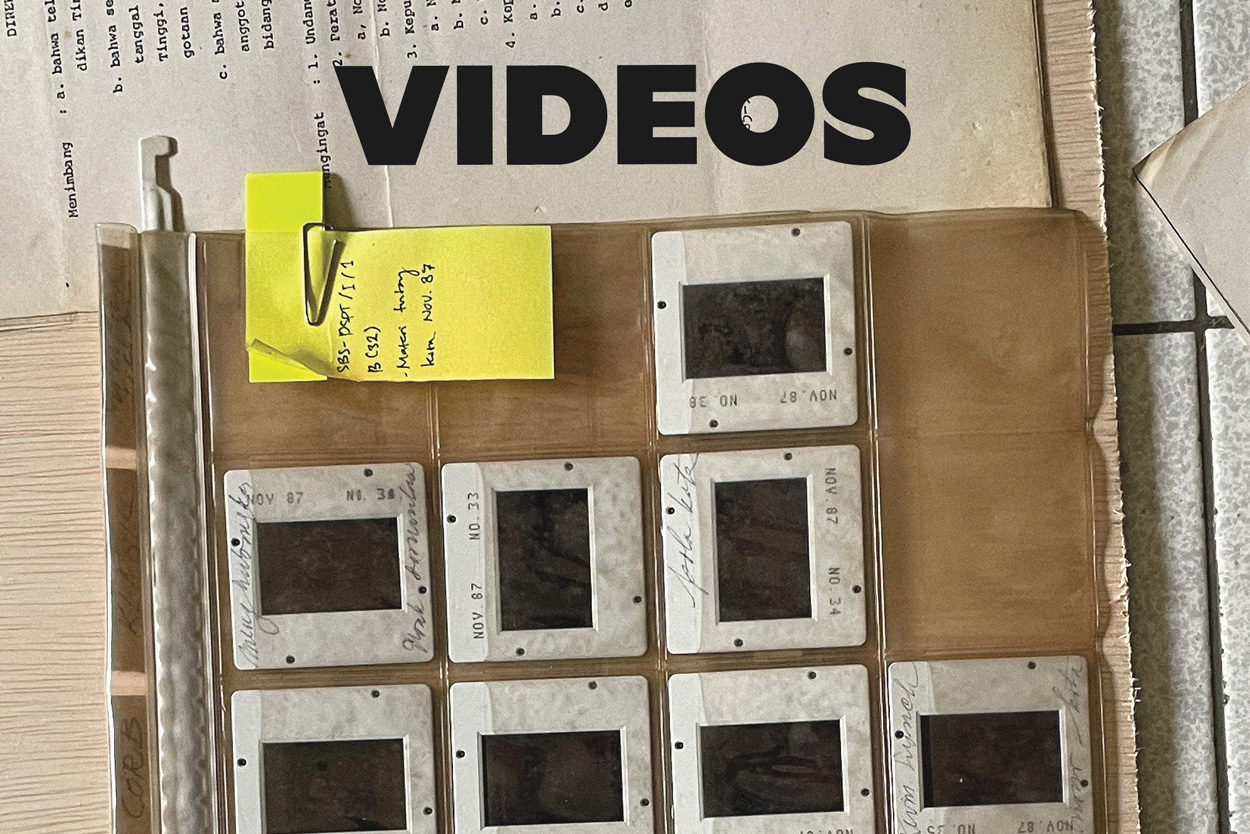project
On the occasion of the 70th anniversary of diplomatic relations between the Federal Republic of Germany and the Republic of Indonesia, Dipl.-Ing. Arsitek: German-trained Indonesian Architects from the 1960s examines an inspiring aspect of this joint architectural history that has received little attention to date.
Indonesia’s development after gaining independence from the colonial rule of the Netherlands in 1949 and Germany’s reorientation after the Second World War resulted in new opportunities for knowledge transfer. Starting in the mid-1950s, a growing number of young people from Indonesia came to study in West Germany, with some studying in East Germany as well. After gaining their degree, the majority of them returned home, often going on to pursue impressive careers.
Dipl.-Ing. Arsitek: German-trained Indonesian Architects from the 1960s provides insight into German-Indonesian knowledge transfer in the field of architecture, based on the final projects of Indonesian architecture students at Technische Universität Berlin and Technische Universität Hannover in 1960 and 1961. It explores the lives and work 12 architects, amongst them Bianpoen, Han Awal, Mustafa Pamuntjak, Soejoedi Wirjoatmodjo, Suwondo Bismo Sutedjo, and Yusuf Bilyarta Mangunwijaya, who returned to their homeland and became protagonists of modern Indonesian architecture. Jan Beng Oei and Heriantro Sulindro who found a new home in southern Germany and Switzerland, are featured as representatives of those who remained in Europe.
background
Upon gaining independence in the mid-20th century, many cities in Southeast Asia changed dramatically in terms of their physical appearance. Accompanying the task of becoming an independent nation was the desire for a symbolic new beginning in architecture and urban planning. International modernism not only offered an aesthetic programme that reflected expectations of progress and prosperity, but also served as a means of emancipation from the former colonial powers. Local modernities were created, based on an understanding of cultural specifics and the climatic requirements of building in tropical regions. These ambitions are reflected in Indonesia’s modern architecture too, which emerged after the country gained independence in 1949.
In Europe, this period of Indonesian architectural modernism is largely unknown. In the region itself, however, intensive local discourses have been unfolding in recent years. On the one hand, they involve re-framing what until now has been a strongly western-centric notion of modernism. The question of whether these buildings should be preserved at all has also been hotly debated. Diverse initiatives, architects, and artists are engaged in re-evaluating the architectural heritage of an era of great importance for these countries – which is increasingly being lost in the wake of the Asian real estate boom. Finally, it is also about acknowledging a forward-looking (tropical) modernism that inspires new approaches to urban design.
Dipl.-Ing. Arsitek: German-trained Indonesian Architects from the 1960s contributes to the current discourse on Southeast Asian modernism and enhances it by addressing relations between Indonesia and Germany in the field of education and tracing the work of outstanding Indonesian architects up to the 1990s. This is the first time that attention has been drawn to the achievements and concepts of the selected architects in the context of their studies in Germany. A closer look at their final projects shows that both knowledge transfer and migration history are important aspects to consider as part of the broader discourse. Launched on the 70th anniversary of German-Indonesian diplomatic relations, this project exemplifies mutual cultural appreciation and the positive force that can be achieved through academic and cultural exchange.
Dipl.-Ing. Arsitek: German-trained Indonesian Architects from the 1960s is funded by the German Federal Foreign Office on the occasion of the 70th anniversary of diplomatic relations between the Federal Republic of Germany and the Republic of Indonesia.
 Supporters
Supporters
 PT. Estica International (authorized distributor of Schuco, Technal, Vento)
PT. Estica International (authorized distributor of Schuco, Technal, Vento)
PT. Romulo Nusantara Perkasa (sole distributor of Keim)
Partners
 Technische Universität Berlin
Technische Universität Berlin
Technische Universität Berlin, Architekturmuseum
Goethe-Institut Indonesien
team
Initiators:
Sally Below, Moritz Henning, Eduard Kögel
Artistic direction:
Avianti Armand, Sally Below, Moritz Henning, Eduard Kögel, Setiadi Sopandi
Exhibition curators:
Setiadi Sopandi and Avianti Armand with Sally Below, Moritz Henning, Eduard Kögel
Symposium curators:
Sally Below, Moritz Henning, Eduard Kögel
Consultants: Avianti Armand, Setiadi Sopandi
Publication editors:
Moritz Henning, Eduard Kögel
Consultants: Avianti Armand, Sally Below, Setiadi Sopandi
Curatorial and research team:
Adelia Andani Djarot, Adetania Pramanik, Angeline Basuki, Avianti Armand, Bangkit Mandela, Eduard Kögel, Febriyanti Suryaningsih, Fernisia Winnerdy, Gregorius Jasson, Hedista Rani Pranata, Setiap Gedung Punya Cerita, Jesslyn Amanda, Moritz Henning, Nadia Purwestri, Nadira Adiswari, Rifandi Nugroho, Setiadi Sopandi, Siti Arfah Annisa, Trisha Karina Lahu, Warda Lutfiah Roihana
Photography, photographic reproduction, and imaging services (Indonesia):
Arti Fenestra Group, Jakarta, Indonesia
Photography (Germany):
Moritz Bernoully, Frankfurt/Main, Germany
Visual identity:
gemasemesta.co, Jakarta, Indonesia
Exhibition design:
FFFAAARRR, Jakarta, Indonesia
Exhibition production:
Yayasan Museum Arsitektur Indonesia, Jakarta, Indonesia
sbca, Berlin, Germany
Project management and communication:
sbca, Berlin, Germany
Yayasan Museum Arsitektur Indonesia, Jakarta, Indonesia
Translations and copy editing:
Alisa Kotmair, Paul Cohen
Yayasan Museum Arsitektur Indonesia
Thanks to:
Pusat Dokumentasi Arsitektur, Yori Antar Awal, Maria Daryati Awal, Daisy Gandasubrata, Maria Widyati Awal, PT Han Awal & Partners, Carla Bianpoen, Mirah Miryatta, Ranan Samanya, Maruto dan Cecilia Sutedjo, Endang Pamuntjak, Laksmi Pamuntjak, Sharmi Ranti, Santoso Soejoedi, Hadijanto Soejoedi, Arya Abieta, Eko Prawoto, Linda Hoemar, Linda Lochmann, Jan Beng Oei, Steffen Oei, Thomas Oei, Marc Oei, Birgit Steffan/Rumah Budaya Indonesia Berlin, Elias Baumgarten, Nadia Bendinelli, Technische Universität Berlin, Architekturmuseum (Architecture Museum), Technische Universität Berlin, Universitätsarchiv (University Archive), PT Pembangunan Jaya, Miles Production, Dinamika Edukasi Dasar




